Version 1.72
Patch: 1.72.59
Date: 19th Dec 23
- Issue: The non-admin users of the customer were facing a component error on the Converse desk.
Fix:
The non-admin users of the customer were facing a component error on the Converse Desk. The unused and unreferenced code was causing this problem.
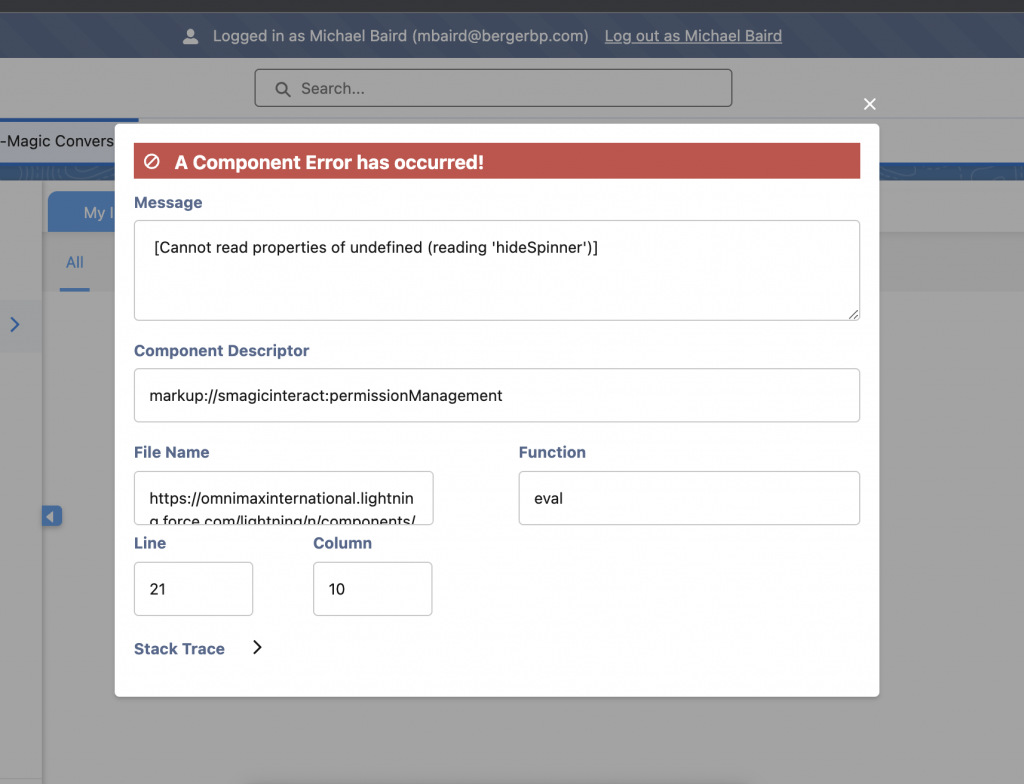
2. Issue: Users of the customer were facing an error in the audit history for recent records.
Fix:
The customer was facing an error on all recently created non-handset consent records. They were not able to see the audit history. It was giving an error. The issue was not noticed for incoming SMS. A few older non-handset consent records also did not show any error. Wrong syntax was used in dynamic query due to which this error occurred.
To solve the query, changed the dynamic query to use a variable instead of the Map.keySet() method.
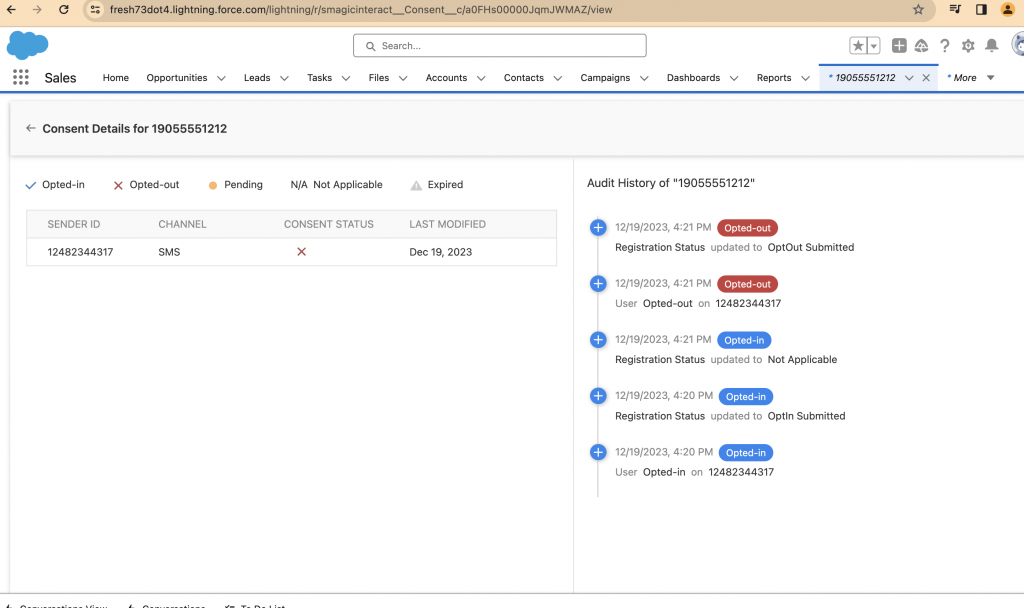
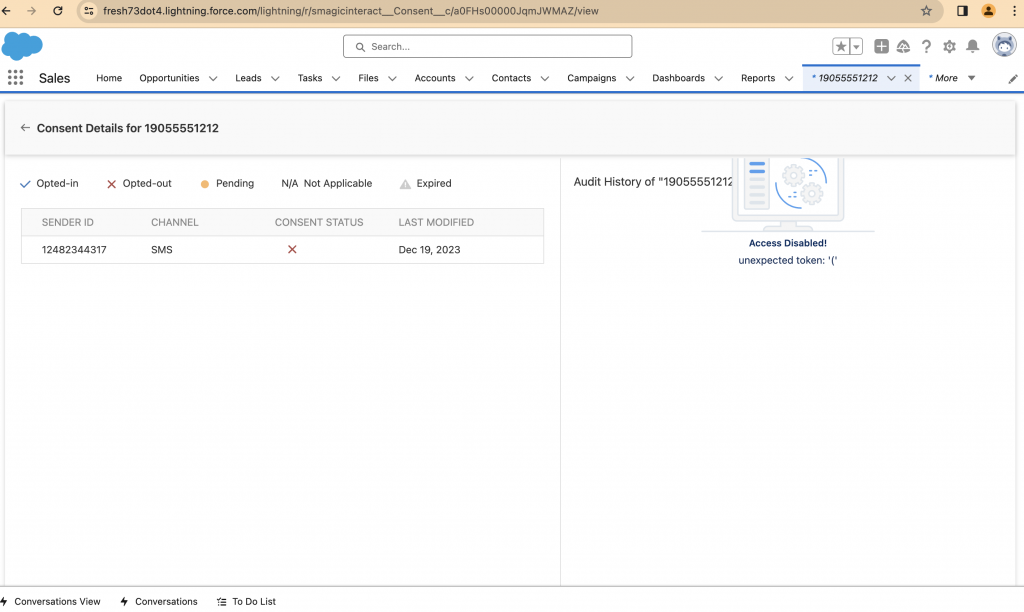
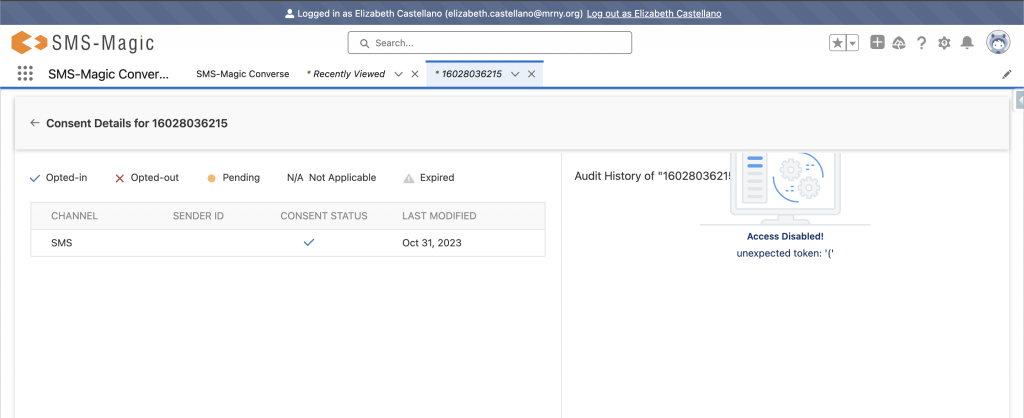
Patch: 1.72.60
Date: 27th Dec 23
- Issue: The utility bar conversation view record text was overlapping for the customer
Fix:
The Utility Bar Conversation View record text was overlapping for some account records. This was not happening for all the account records. To solve this issue, the slds-truncate class was applied to the UI.
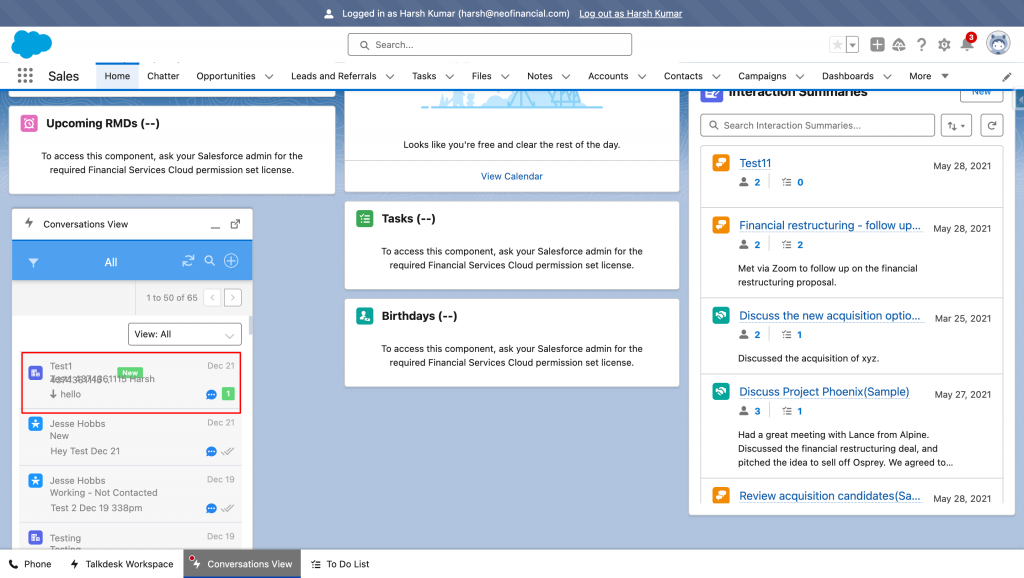
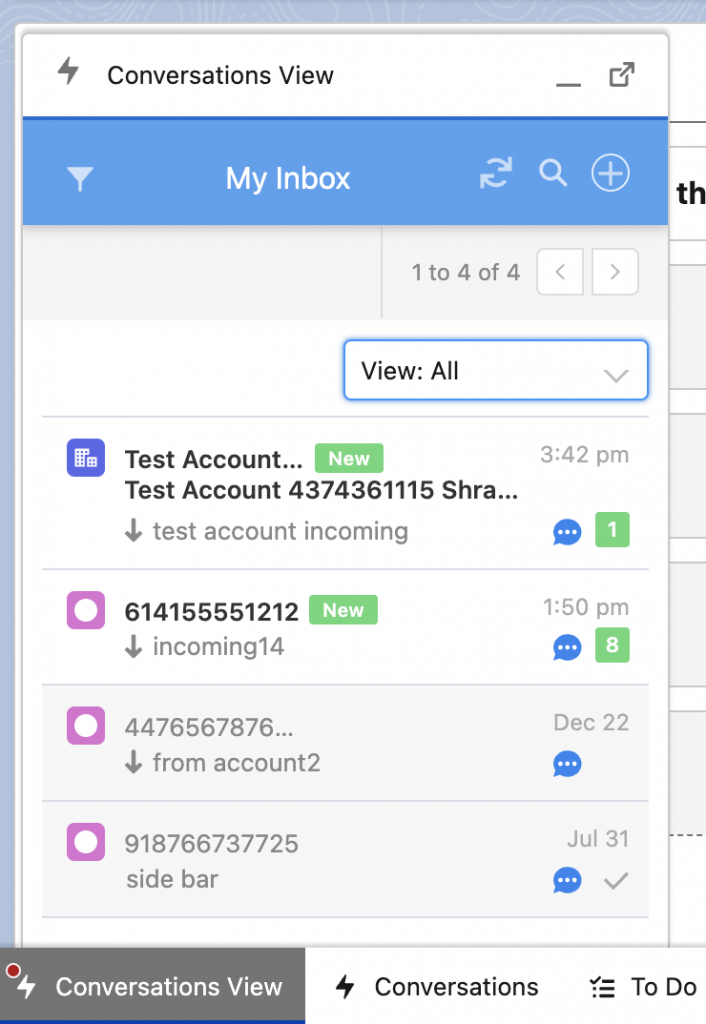
Patch: 1.72.55
Date: 8th Dec 23
- Issue: The user was facing an error while upgrading the managed package.
Fix:
The users of the customer were facing an invalid definition error while upgrading the managed package. To solve the issue, created a new .design file for the component ‘createTemplateComponent’ as suggested in one of the workarounds.
2. Issue: The user was facing a name field issue while creating a shortened link via custom code.
Fix: The user was facing a name field error while creating a shortened link via a custom code. A specific value for the “Name” field was provided. Still that value was not picked up while creating the shortened link record. Value for the name field was inherited from the long URL. To solve the issue, a condition to populate the value for the name field of the ShortenedLink record was added, only if it was not provided.
Patch: 1.72.52
Date: 30th Oct 23
- Issue: Scrolling Functionality Restored in Template Dropdown
Fix:
After upgrading to the latest version (1.72.51), users in the customer’s organization lost the capability to scroll through templates in the ‘Insert template’ dropdown. This issue required users to type the title or a word to locate the desired template, impacting the user experience.
The issue has been successfully resolved with the following solution:
- CSS Adjustment for Template Dropdown: CSS has been added to the template dropdown component to allow scrolling of the template list. This enhancement ensures that users can now scroll through the template list when the number of templates exceeds the initial UI capacity.
With this adjustment, users will regain the ability to scroll through the template list, providing a more user-friendly experience when selecting templates. The patch addresses the reported issue and ensures that the scrolling functionality is restored in the ‘Insert template’ dropdown after the upgrade to version 1.72.51.
Patch: 1.72.51
Date: 24th Oct 23
- Issue: Error on Converse Home
Fix:
Users encountered an error message on Converse Home, specifically a “Too many query rows: 50001” error. This issue was associated with the execution of a query in the analytics controller that ran on the user object and executed twice. The large user count in the organization contributed to the query exceeding the Salesforce limit of 50,000 rows.
The root cause of the problem was identified in the analytics controller class, where the query was running on the user object and executing twice. The combination of a large user count and the execution of the query on the user object contributed to the “Too many query rows” error.
The issue has been successfully resolved with the following solution:
- Query Adjustment to License Object: The query in the analytics controller class has been modified to execute on the license object rather than the user object. This change ensures that the result records count is limited to licensed users only, preventing the “Too many query rows” error.
- Null Check Addition: A null check has been added in the Message List Component Server Controller class. This additional validation enhances the code’s robustness and stability.
With these modifications, users will no longer encounter the “Too many query rows” error on Converse Home, and the data should be displayed correctly even in organizations with a large user count. The patch addresses the reported issue and ensures a more reliable and error-free experience for users on Converse Home.
- Issue: Email Notifications not working for Unassigned Sender ID
Fix:
Users experienced a scenario where email notifications were not functioning if a user was not assigned to the sender Id associated with an incoming message. This issue was linked to the code’s filtering mechanism, which was based on sender ID visibility.
The root cause of the problem was identified in the code, specifically in the filtering mechanism for sender IDs based on visibility. This mechanism was preventing email notifications from being sent if the user was not assigned to the sender Id associated with an incoming message.
The issue has been successfully resolved with the following solution:
- Sender ID Filtering Adjustment: The code’s sender ID filtering mechanism has been adjusted to allow email notifications even when the user is not assigned to the specific sender ID associated with an incoming message.
With this modification, users will now receive email notifications for incoming messages, even if they are not assigned to the sender ID linked to the message.
- Issue: Error Log Generation in Message List Component Server Controller
Fix:
An error log with the message “Attempt to de-reference a null object” was generated for all users in the Message List Component Server Controller class. This issue occurred when rendering media messages in the Conversations component, either in Converse Desk or when embedded in a record detail page.
The issue has been successfully resolved with the following solution:
- Query Adjustment to License Object: The query in the Analytics Controller class has been modified to execute on the license object rather than the user object. This change ensures that the result records count is limited to licensed users only, preventing the “Too many query rows” error.
- Null Check Addition: A null check has been added in the Message List Component Server Controller class. This additional validation enhances the code’s robustness and stability, preventing the “Attempt to de-reference a null object” error.
With these modifications, users will no longer encounter the error log related to “Attempt to de-reference a null object” when rendering media messages in the Conversations component. The patch addresses the reported issue and ensures a more reliable and error-free experience for users in Converse Desk and when viewing media messages embedded in record detail pages.
Patch: 1.72.50
Date: 20th Oct 23
- Issue: Conversation View Loading Issue
Fix:
Users were encountering a problem where the Conversation component at the record level was continuously loading, preventing its proper use.
The root cause of the problem was identified, the logic to hide the composer spinner was placed inside a condition checking for the existence of the old compliance. This condition was not evaluating correctly when the new compliance was enabled, leading to the spinner not hiding.
The issue has been successfully resolved with the following solution:
- Condition Removal: The condition checking for the existence of the old compliance has been removed. Hiding the composer spinner is required irrespective of whether the old or new compliance is active. This modification ensures that the spinner hides automatically.
With this adjustment, users should no longer experience the continuous loading issue with the Conversation component at the record level. The patch addresses the reported problem, allowing for a smoother and more reliable user experience with the Conversation view.
- Issue: Mobile number display in popover bubble for individual messages
Fix:
In the previous version of SMS Magic (e.g., V1.60.xx), the recipient’s phone number was displayed in the popover bubble of individual messages. However, in the newer versions, if the text message was short, the number would only show partially, and the popover bubble did not display the recipient’s phone number as expected.
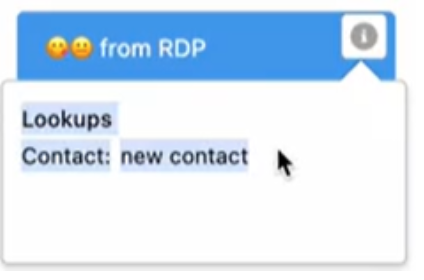
The root cause of the problem was identified as a potential removal of the corresponding functionality during the development of newer versions or additional functionalities.
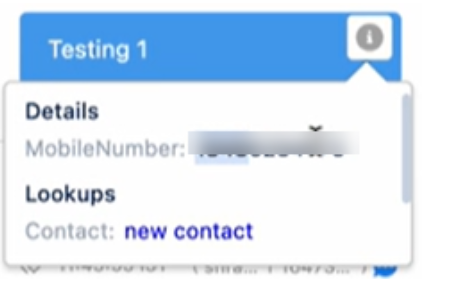
The issue has been successfully resolved with the following solution:
- Conditional Mark-up Addition: Conditional mark-up has been added in the message component file to display the recipient’s mobile number when the setting is enabled from Converse settings.
With this modification, the recipient’s mobile number is now displayed in the popover bubble for both incoming and outgoing messages, providing users with the expected and complete information. The patch addresses the reported issue, ensuring a consistent and accurate display of mobile numbers in the popover bubble for individual messages.
- Issue: Email-to-Text functionality issue for Admin (when Guest User configured with same Email ID)
Fix:
Users encountered an issue with the Email-to-Text functionality when configured for admin users. Specifically, when a guest user was configured with the same email id as the admin user, the outgoing message record was encountering an error due to the guest user being returned as the owner.
The root cause of the problem was identified as the configuration of a guest user with the same email id as the admin user. When fetching user records based on email, the guest user record was returned in the result, and as guest users cannot own records in the org, an error occurred.
The issue has been successfully resolved with the following solution:WHERE Clause Addition in User Query: In the user query, a WHERE clause has been added to filter the user type for ‘standard’ users. This modification ensures that when fetching user records based on email, only standard users are considered.
With this adjustment, incoming and outgoing message SMS history is now created in the Salesforce org without encountering the previous error. The patch addresses the reported issue, allowing for the smooth operation of the Email-to-Text functionality even in scenarios where a guest user shares the same email id as an admin user.
Patch: 1.72.47
Date: 4th Oct 23
- Issue: Last Incoming Lookup and Last Incoming Time was not getting populated with encrypted phone fields.
Fix:
Users experienced an issue where the Last Incoming Lookup and Last Incoming Time fields were not getting populated on the conversation object, specifically when encryption was enabled on phone fields. This resulted in incomplete and inaccurate information being displayed on the Converse desk.
The root cause of the problem was identified in the code, which encountered errors when querying on Message Object Configuration (MOC) phone fields, especially when they were encrypted. This issue affected the accurate population of Last Incoming Lookup and Last Incoming Time fields.
The issue has been successfully resolved with the following solution:Error Handling for Encrypted Phone Fields: The code has been updated to handle errors related to encrypted phone fields during querying. This adjustment ensures that Last Incoming SMS Record and Last Message Time are now correctly populating on the conversation object, even when phone fields are encrypted.
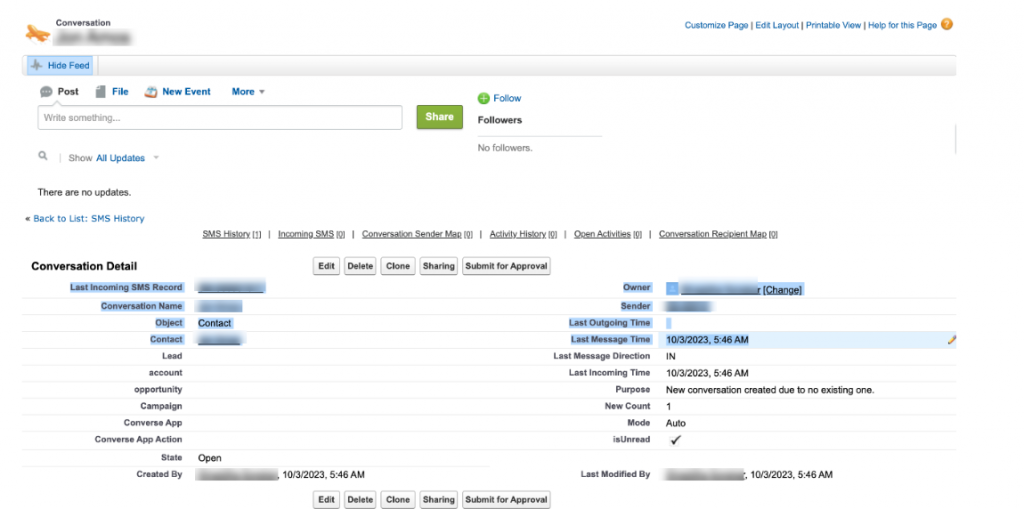
With this enhancement, users will now observe accurate and complete information for the Last Incoming Lookup and Last Incoming Time on the conversation object, improving the reliability of data on the Converse desk. The patch addresses the reported issue and ensures a more robust functionality in the presence of encrypted phone fields.
- Issue: A new feature has been introduced to play a sound notification upon conversation assignment. This enhancement is designed to provide users with an audible alert when they are assigned a conversation. The feature is configurable and will only activate if a specific static resource is present with a predefined value.
Fix:
The improvement has been successfully implemented with the following solution:
- Static Resource Configuration: The system now checks for the presence of a specific static resource with a predefined value (e.g., a static resource named “Conversation Assignment Sound” with the value “true”).
- Play Sound on Assignment: If the configured static resource is present with the correct value, a sound notification will be played upon conversation assignment. This feature aims to enhance user awareness and responsiveness to newly assigned conversations.
- With this enhancement, users will receive sound notifications after the assignment of conversations, providing an additional means of alert for improved workflow management. The patch introduces a customizable and user-friendly experience for users engaged in conversation assignments.
- Issue: A new feature has been introduced to play a sound notification upon conversation assignment. This enhancement is designed to provide users with an audible alert when they are assigned a conversation. The feature is configurable and will only activate if a specific static resource is present with a predefined value.
Users encountered an issue where, despite removing custom permissions for specific users to restrict access to Conversations Actions such as “Close Conversation” and “Assign Conversation,” the “Close Conversation” option remained enabled for those users. This discrepancy in behavior resulted in inconsistent access control.
The root cause of the problem was identified in the conversation header component. The necessary code to disable the “Close Conversation” option was missing, leading to the persistence of the option even after the removal of custom permissions.
The issue has been successfully resolved with the following solution:
- Updated the conversation header component functionality to disable the “Close Conversation” option. This ensures that users without the necessary custom permissions no longer have access to the “Close Conversation” functionality.
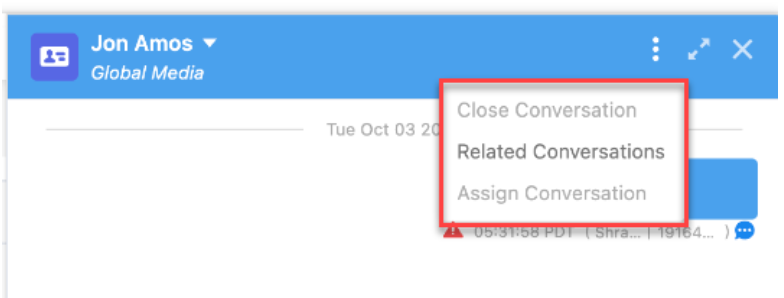
With this adjustment, users will experience consistent access control for Conversations Actions, and the “Close Conversation” option will be appropriately disabled for users without the required permissions. The patch addresses the reported issue and ensures accurate enforcement of access restrictions.
Fix:
Patch: 1.72.47
Date: 6th Sept 23
- Issue: Customer was getting License Restriction Error on Attaching Media File in Global Message and Sidebar.
Fix:
Users faced a license restriction error when attempting to attach a media file to a global message and sidebar in the Salesforce org. The error prevented the successful attachment of MMS files, causing inconvenience for users.
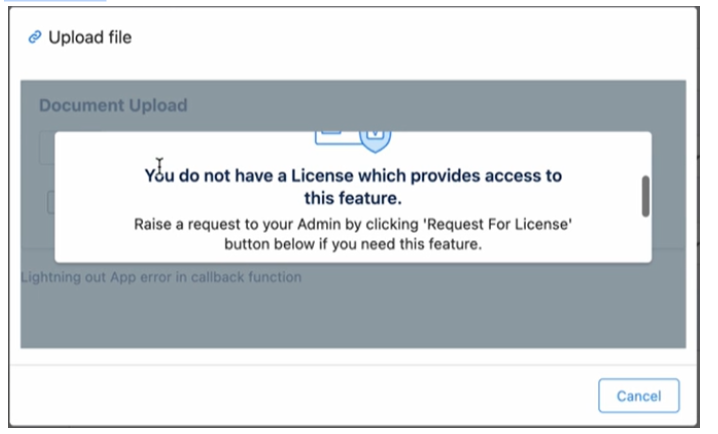
The root cause of the problem was identified in the post message function where the source URL was not matching. This discrepancy in the source URL was triggering a license restriction error, preventing the smooth attachment of media files in global messages and sidebars.
The issue has been successfully resolved with the following solution:
- Source URL Matching Fix: The source URL in the post message function has been adjusted to ensure accurate matching. This correction eliminated the license restriction error that was occurring during the attachment of MMS files in global messages and sidebars.
With this adjustment, users will now be able to attach media files to global messages and sidebars without encountering license restriction errors.
Patch: 1.72.46
Date: 28th Aug 23
- Issue: Issue with Conversation View in Utility Bar
Fix:
Users encountered issues related to the conversation view within the utility bar in the Sales app. Two specific problems were identified:
- When embedding the Conversation view in the utility bar for the Sales app with the “Enable Contextual Conversations” value set to false, the conversation did not load after opening a contact or lead record from the Sales Home.
- All conversation actions were opening in a new tab instead of a new window from the utility bar
The root cause of these issues was traced to the absence of a check for contextual conversations when closing a conversation. This omission affected the loading of conversations in the utility bar and the behavior of conversation actions in terms of opening in a new tab.
The issues have been successfully resolved with the following solution:
- Contextual Conversation Check for Closing: A check for contextual conversations has been added to ensure proper handling when closing a conversation. This addition addresses the loading issue of conversations in the utility bar when the “Enable Contextual Conversations” value was set to false.
- Consistent Opening of Conversation Actions: All conversation actions from the utility bar now consistently open in new tabs, aligning with expected behavior.
With these adjustments, users should no longer encounter issues with the conversation view in the utility bar in the Sales app. The patch addresses the reported problems, ensuring a smoother and more reliable experience for users interacting with conversations in the specified context.
- Issue: Records Count Showing Zero in Converse App Bulk Campaign.
Fix:
Users encountered a discrepancy where the records count in the Converse App’s “Send Bulk Message” window displayed as zero, even when records were present in the list view. This issue specifically occurred when creating a list view with a Campaign filter, and selecting that list view while sending a bulk campaign.
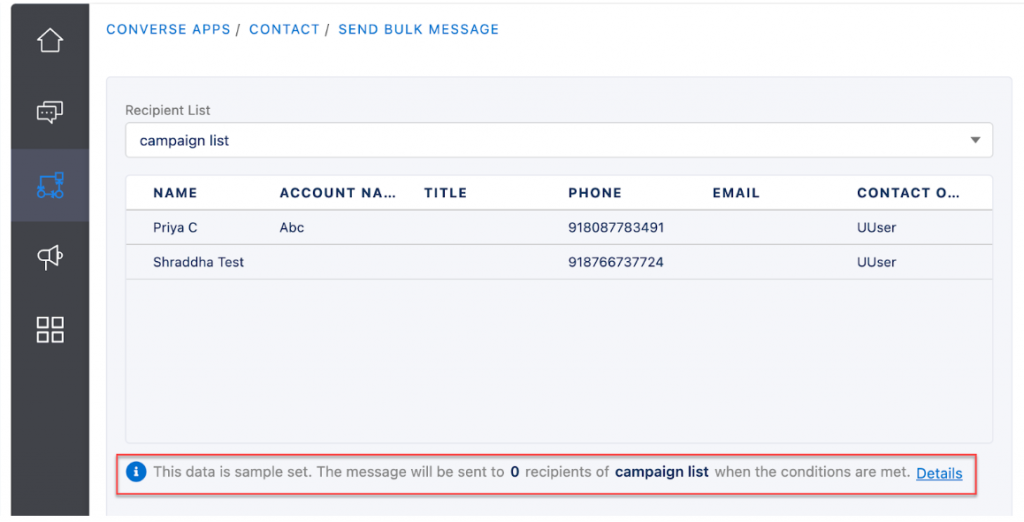
The root cause of the problem was identified as a limitation on the Salesforce side. When using an aggregate query with a Campaign filter added on the list view, it returned a count of zero, leading to an inaccurate representation of the records available for the bulk campaign.
The issue has been successfully resolved with the following solution:
- To address the limitation of the aggregate query returning zero counts, the system now hides the count display in the Converse App’s “Send Bulk Message” window when the count is zero but records are present in the list view. This ensures a more accurate representation of the available records for the bulk campaign.
With this adjustment, users will no longer encounter misleading information about the records count when using a list view with a Campaign filter during the creation of a bulk campaign. The patch enhances the user experience by providing more reliable and transparent information in the Converse App.
Patch: 1.72.45
Date: 24th Aug 23
- Issue: Users were not able to send bulk SMS
Fix:
Users reported an issue where they were unable to send bulk SMS, with the SMS getting stuck in the “submitted” status.
The root cause of the problem was identified as a lack of access to the campaign field on the batch tracker object for the affected user. This absence of access hindered the proper execution of bulk SMS sending, resulting in SMS messages being stuck in the “submitted” status.
The issue has been successfully resolved with the following solution:
- Field Access Check on Batch Tracker Object: A check for access to the campaign field on the batch tracker object has been implemented. Before running the query for sending bulk SMS, the system now verifies that the user has the necessary access to the campaign field. This ensures that users can send bulk SMS without encountering issues related to field access.
With this adjustment, users should no longer face obstacles in sending bulk SMS, and the problem of SMS messages getting stuck in the “submitted” status has been effectively addressed. The patch enhances the overall functionality and reliability of the bulk SMS sending feature.
- Issue: Sender ID & Channel Not Mapped
Fix:
Following the upgrade of the customer Sandbox account from version 1.58.48 to version 1.72.35, automated messages were failing with the error message: “Channel and senderid not mapped.”
The issue was traced to the handling of sender IDs during message processing. Specifically, the inclusion of a ‘+’ before the sender ID was causing the error, resulting in the mentioned error message.
The issue has been successfully resolved with the following solution:
- Sender ID Handling Adjustment: The process of appending ‘+’ before the sender ID has been reviewed and rectified. This adjustment ensures that sender IDs are processed correctly, eliminating the error that occurred during automated message testing post-upgrade.
This patch ensures the smooth execution of automated messages in the customer’s Sandbox account following the upgrade to version 1.72.35. Users can now confidently deploy automated messages without encountering any error.
- Issue: Component Error When Attaching Media Files on Conversation Component
Fix:
Users encountered a component error when attempting to attach media files to the Conversation component in Converse Desk. The error occurred during the process of saving the file, and further complications arose when attempting to cancel the operation.
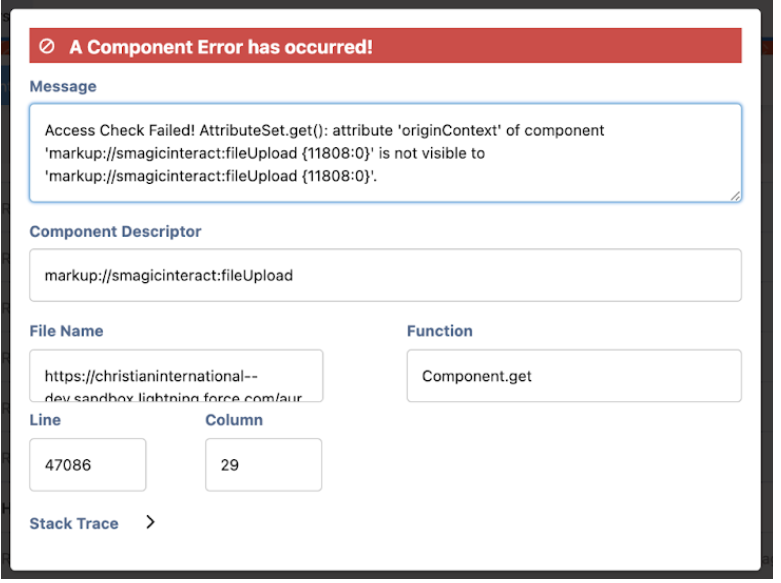
The absence of the defined origin context variable in the Upload Controller file was identified as the root cause of the issue. This omission led to a component error when interacting with media files in the Conversation component.
The following solution has been implemented to resolve the issue::
- Origin Context Variable Definition: The origin context variable has been defined in the Upload Controller file. This addition ensures that the necessary context is established, addressing the component error encountered during media file attachment.
With this adjustment, users should now be able to seamlessly attach and save media files within the Conversation component without experiencing errors during the saving or cancellation process. The patch addresses the reported issue and enhances the overall functionality of media file handling in Converse Desk.
Patch: 1.72.44
Date: 07th Aug 23
- Issue: Improvement for Showing Seconds and Time Zone in Chat Conversation Topic Window
Fix:
This patch introduces an enhancement to the display of messages within the Chat Conversation Topic window. Specifically, it improves the presentation by including seconds in the timestamp and replacing AM/PM with the user’s time zone.
Details:
- Show Seconds in Timestamp: Messages in the Chat Conversation Topic window now include seconds in the timestamp. This refinement offers users a more precise understanding of the timing of each message.
- Display User Time Zone: Instead of AM/PM, the timestamp now reflects the user’s time zone. This change provides users with immediate visibility into the time context of messages based on their individual time zone settings.
Validated the functionality across multiple browsers, including Chrome, Safari, and Firefox, to ensure consistent and reliable performance.
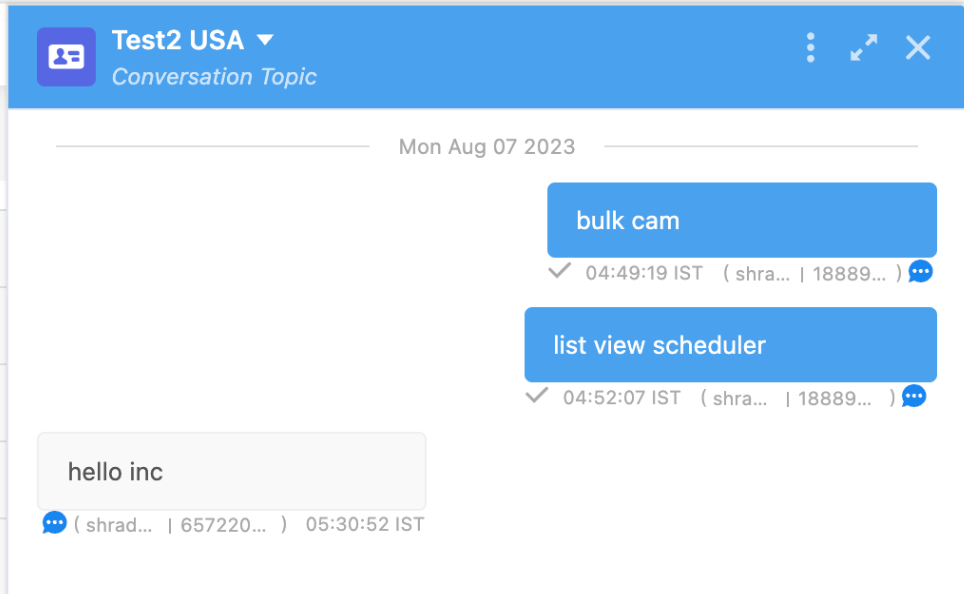
Users can now enjoy a more granular timestamp and a personalized time zone representation in the Chat Conversation Topic window, contributing to an improved and user-friendly messaging experience.
Patch: 1.72.43
Date: 07th Aug 23
- Issue: Unable to Install SMS-Magic in the Salesforce Instance.
Fix:
Users encountered difficulties installing SMS Magic version 1.72.40 in their Salesforce instance. The installation process failed, particularly when attempting to install the package.
The installation failure was traced back to encrypted fields on critical objects (account, contact, user, lead). The encrypted fields were causing the installation to fail, specifically generating an error stating, “cannot be filtered in a query call.”
To resolve the installation issue related to encrypted fields, we have implemented the following solution:
- Used Encrypted Field in WHERE Clause: We have modified the installation process to accommodate the encrypted fields by incorporating them into the WHERE clause. This adjustment ensured that the package installation was successfully handled with encrypted fields on the specified objects (Account, Contact, User, Lead).
With these changes, users should now be able to install SMS Magic version 1.72.40 successfully, even in instances where certain fields are encrypted.
- Issue: Data Migration Improvement for Timeframe
Fix:
The Data Migration page in Salesforce lacked a crucial option to specify a migration timeframe, causing users to face challenges when attempting to migrate data selectively. To address this limitation, we have introduced an option enabling users to migrate data either from a specific date or encompassing all available data.
Details:
Enhancements have been made to the Data Migration functionality in Salesforce, specifically addressing the need for improved control over the timeframe for data migration. Previously, users encountered limitations in selecting the data migration timeframe.
To empower users with more control over their data migration process, the following solution has been implemented:
- Selectable Data Migration Timeframe: In the Salesforce Data Migration page, users can now choose between migrating all available data or specifying a particular date from which the migration process should commence. This option provides flexibility and precision, allowing users to tailor their data migration according to specific business needs or compliance requirements.
With this enhancement, users can experience a more streamlined and efficient data migration process, selecting the timeframe that best suits their operational requirements. This improvement is designed to enhance the overall usability and functionality of the Data Migration feature within SMS Magic and offer a more refined data migration experience for users.
- Issue: Default Notification Settings Saving Issue
Fix:
Users reported an issue where changes made to the “Default Notification Settings” in Converse settings were not persisting. Specifically, when selecting “Reply to address (Email ID)” and attempting to save, the changes were being reverted upon page refresh.
We have identified a duplication of the Default Email Template and a compatibility issue with the Lightning Web Security session setting. The redundancy in the Default Email Template and the error thrown by the aura modal when Lightning Web Security was enabled contributed to the inability to save Default Notification Settings successfully.
To address this issue, the following solution was implemented:
- Default Email Template Redundancy Fix: The duplication of the Default Email Template was rectified, eliminating any conflicting settings that might have hindered the saving of Default Notification Settings.
- Lightning Web Security Compatibility Enhancement: Compatibility with Lightning Web Security was improved to prevent errors in the aura modal. This ensured a seamless saving process for Default Notification Settings, even when Lightning Web Security was enabled.
With these changes, users should now be able to successfully save Default Notification Settings without encountering issues related to duplication and Lightning Web Security. The patch addresses the reported problem and enhances the overall stability of the Converse settings.
Patch: 1.72.42
Date: 28th July 23
- Issue: The customer was facing a component error
Fix:
The Customer reported a component error when the Aircall was terminated from the lead. It was an intermittent problem.
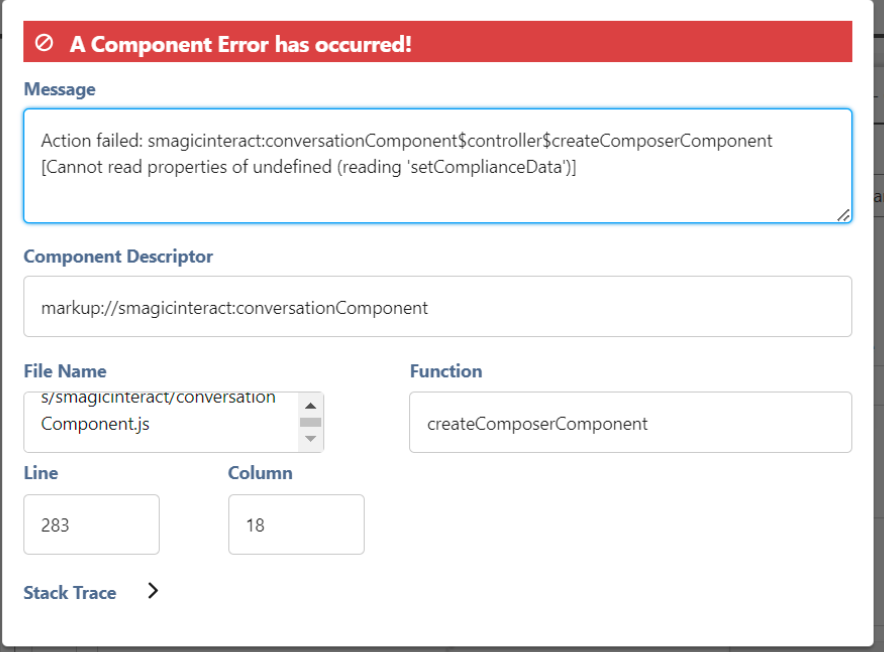
The issue stemmed from the Compliance Data method of the Composer Component in the conversation component controller file, which was not returning the expected value.
To address this, we have implemented the following solutions:
- Validation Added for Compliance Data Method: We enhanced the validation process for the Compliance Data method in the conversation component controller file. This ensured that the method consistently returned the expected value, mitigating the component error observed during air call termination.
- Null Check for Compliance Data Method in Composer Component Controller: A null check was incorporated for the Compliance Data method in the Composer Component controller. This addition aimed to prevent unexpected behavior and resolve the intermittent component error observed during air call termination.
These updates collectively addressed the component error issue reported by the customer, providing a more robust and reliable experience during and after air call interactions. Users should no longer experience disruptions related to the described problem.
Patch: 1.72.40
Date: 14th July 23
- Issue: The customer faced an issue while creating a new task and logging a call.
Fix:
An error occurred while the customer tried to create a new task and log a call in the organization. The error stated a system null pointer exception while attempting to de-reference a null object.
We observed that the error was caused by missing the empty value condition for the subject and description fields in the creation process (create Converse task method). We have resolved this by adding the necessary ‘not null’ conditions for the subject and description fields in the Converse task trigger helper.
Patch: 1.72.25
Date: 15th Feb 23
- Issue: The customer was facing an error related to automation for community users after the post-upgrade.
Fix:
An error occurred while the community user performed automation post-upgrade.
The customer had configured 11 objects as MOC and had an automation setup on the service appointment object. This triggered the automation by changing a field value via a community user, and the automation failed with an error related to access to quote and lead objects.
It was analyzed that the community user could not access quotes and lead objects. We have checked the permissions of all the objects configured as MOC while triggering the automated message and now resolved the issue.
Patch: 1.72.26
Date: 17th Feb 23
- Issue: The customer faced an issue with the custom MLUI service injection point.
Fix:
An error occurred while the customer fetched the list of messages, as the custom MLUI service injection point was not working as expected. It was observed that when the custom message list UI service injection point was enabled, it was applied to the embedded conversation component on the record details page. In this component, the list of messages should have been listed as per the logic written in the custom injection class (overriding the default package behavior) only after the composer component is loaded.
It was further analyzed that the messages were displayed even before the composer component was loaded by passing the injection point during the initial component load and defeating the injection point functionality. Due to this complex component architecture, the message list was fetched from multiple methods rather than just one.
We analyzed the complex component architecture and unified the source for fetching the list of messages, and the issue is now resolved.
Patch: 1.72.27
Date: 20th Feb 23
- Issue: The customer was facing an error related to automation for community users after the post-upgrade.
Fix:
An error occurred while the community user performed automation post-upgrade.
It was observed that the customer had configured 11 objects as MOC and had an automation setup on the service appointment object. This triggered the automation by changing a field value via a community user, and the automation failed with an error related to access to quote and lead objects.
The community user could not access quotes and lead objects. We have checked the permissions of all the objects configured as MOC while triggering the automated message and now resolved the issue.
Patch: 1.72.30
Date: 10th Mar 23
- Issue: The customer was facing an error related to Client Customisation Request.
Fix:
An error occurred when the outgoing message was not reflected on the conversation component after being sent.
We observed that whenever the customer sent outgoing messages from the conversation component on the detail page, they were not reflected on the message lists. Also, when the incoming messages were received, they were later reflected in the message list along with the incoming message.
We have analyzed that the customer was using Custom Injection Service for messages, and a JS condition was missing for customization (for outgoing push topic).
We added the missing JS condition and observed that as soon as we send the outgoing message, it’s reflected on the conversation component, and the issue is now resolved.
Patch: 1.72.35
Date: 24th May 23
- Issue: The customer was facing an error related to Sandbox upgrade
Fix:
An issue occurred while setting up and configuring the SMS-Magic application. It was throwing an error related to the Salesforce package installation.
It was observed that the installation failed when the customer was ordering query results based on the contact object’s mobile or phone field. These fields were encrypted in the customer’s organization and could not be used in order by clause in any query. This limitation was causing an installation failure of v1.68.14.
We have removed the order by clause in two queries referring to mobile and phone fields of the contact object and came up with a new build, v1.72.35, and installed it successfully.


